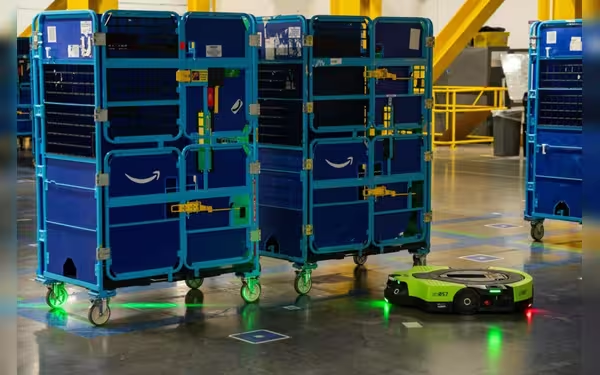Saturday, November 16, 2024 05:27 PM
Amazon's Innovation Drive: AI, Robotics, and Delivery Enhancements
- Amazon introduces advanced delivery technology for faster service.
- Company aims for rapid Prime delivery speeds in 2024.
- Health service One Medical offers quick consultations for Prime members.
 Image Credits: thefrontierpost
Image Credits: thefrontierpostAmazon is revolutionizing shopping with AI, robotics, and faster delivery services, enhancing consumer convenience and efficiency.
Amazon, the giant of e-commerce, is on a mission to revolutionize the way we shop and live. With its roots in online retail, the company is now branching out into various sectors, including artificial intelligence, robotics, health care, and entertainment. This innovation push aims to make life easier for consumers while enhancing the efficiency of its vast logistics network.
Recently, Amazon introduced a new computer system for its delivery vans. This technology helps the vans recognize their stops and determine which packages to drop off, ultimately speeding up the delivery process. Doug Herrington, the head of Amazon Stores, emphasized the importance of quick deliveries, stating, "When we speed up deliveries, customers shop more." He also mentioned that for 2024, Amazon plans to offer the fastest Prime delivery speeds globally, which is a significant promise for its subscribers.
In addition to improving delivery times, Amazon has also managed to reduce shipping costs. Last year, the company cut 45 cents off the cost per unit shipped, which is a substantial saving given the enormous volume of sales it handles. With a profit exceeding $30 billion on revenues of $575 billion, Amazon's success is largely driven by its online retail and AWS cloud computing services.
Amazon's business model is often described as a "flywheel," with its Prime membership at the center. This membership not only encourages shopping but also ties together various services, including retail, advertising, cloud computing, and streaming entertainment. However, this very model has drawn scrutiny, as the company faces a lawsuit from the U.S. government, accusing it of maintaining an illegal monopoly and harming competition.
Data plays a crucial role in Amazon's strategy. The company collects information about consumer preferences to target advertisements and suggest products. This data-driven approach is evident in Amazon's decision to acquire streaming rights for NFL games on Prime Video, which helps the company engage with sports fans more effectively.
Moreover, Amazon's digital assistant, Alexa, has become a household name, allowing users to order products with simple voice commands. The integration of Alexa into appliances, such as washing machines, enables automatic reordering of supplies like laundry detergent, showcasing Amazon's commitment to convenience.
In the health care sector, Amazon is making strides with its virtual health service, One Medical. For a monthly fee of $9, Prime members can access video consultations with health professionals, along with prescription services. The Amazon Pharmacy aims to deliver medications quickly, with a goal of reaching 45% of customers within 24 hours by the end of next year. Hannah McClellan, the chief of Amazon Pharmacy, described it as "building a pharmacy in your pocket that offers rapid delivery right to your door." This move highlights Amazon's ambition to become a comprehensive platform for all consumer needs.
Despite facing challenges in the brick-and-mortar retail space, Amazon continues to innovate. The company plans to open its first "automated micro warehouse" in Pennsylvania next year, adjacent to a Whole Foods Market. This facility will allow customers to pick up online orders filled by robots, enhancing the shopping experience.
Artificial intelligence is also playing a significant role in Amazon's online store. New tools are being developed to help sellers better describe and illustrate their products. For instance, product labels will adapt based on user preferences, displaying terms that are likely to attract attention, such as "strawberry flavor" or "gluten-free." As analyst Suzy Davidkhanian noted, Amazon's AI initiatives aim to streamline the shopping process, making it easier for customers to transition from research to purchase.
At Amazon's logistics center near Nashville, robotic arms are already at work, efficiently sorting packages for delivery. This automation not only improves safety but also allows human workers to focus on more engaging tasks. However, critics have raised concerns about the pressure for speed in Amazon's warehouses, suggesting that it may lead to unsafe working conditions.
Amazon's relentless pursuit of innovation is reshaping the landscape of e-commerce and beyond. As the company continues to expand its reach into various sectors, it remains to be seen how these advancements will impact consumers and competitors alike. With a focus on speed, convenience, and comprehensive service offerings, Amazon is undoubtedly setting the stage for a future where shopping and living are more interconnected than ever.













